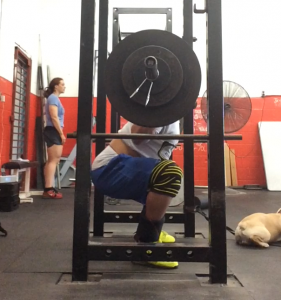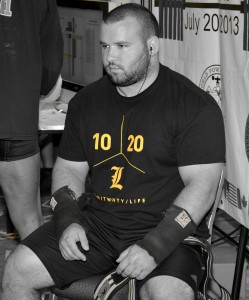
29 Dec What Is Sport Specific Training?
By: Will Kuenzel
This is one that very often gets people confused and frustrated. I’m a competitive Powerlifter and my sport is lifting weights. In the offseason, for me, it’s a lot of anything other than straight bar squatting, benching or deadlifting. I spend time working on areas that have inhibited my performance on the platform. What about those athletes that aren’t powerlifters? What does sport specific mean for them?
I work with quite a few MMA, ju jitsu, and Krav Maga clients. Their sport or practice is doing damage to another person. Weight training is not sport specific for them. I don’t care what special exercise you’ve developed, unless they can take a barbell or a dumbbell into the ring with them, it’s not sport specific. Instead of being sport specific, weight training for them serves several different purposes.
Building strength is the first one. A small guy with a big deadlift is going to be strong. The application of that strength becomes another matter, but moving progressively heavier weights is critical to making an athlete stronger. The basics of strength have always worked and will always work. Building a big squat takes time. Building a big deadlift takes time, but the rewards pay dividends. Since these athletes don’t compete in powerlifting, we can use a variety of bars and ranges of motions to accomplish the things that are necessary for them. Too often the internet gets all fired up about high squats or technique that it doesn’t deem perfect. These athletes aren’t powerlifters though and with a wide array or exercises to utilize, we can still accomplish the same goal of getting stronger without forcing them into bad positions just to satisfy the internet’s desire for perfection.
These same athletes beat their bodies up every day without weight training tossed in on top of it to make it worse. Instead of straight bar squats, we’ll use the safety squat bar. Instead of full range bench, we’ll use more board pressing or floor presses. The hard part is to get these athletes to improve but also leave adequate room for recovery. Careful consideration of their circumstances will dictate what our options for exercises are. Combinations of exercises might have to be used in an effort to alleviate what would ordinarily be additional stress on joints or muscle groups. I will let some of my ju jitsu guys use lifting straps when doing certain exercises because of the high amount of grip work they do in training. We want to avoid overuse injuries, so making them do high rep deadlifts without straps is asking for tendonitis issues.
That leads into the next purpose of training for these athletes. Balance. With the daily or twice-daily beatings they give themselves, some of the things we have to do for them is to counter the work they do with exercises that will keep them healthy. If an athlete is healthy, I won’t consider it prehab because I feel it needs to be challenging enough to actually have an effect. For example, a healthy bencher that doesn’t have any shoulder issues. They’re not going to get a lot out of 10 band pull aparts. Take that same band though and do 100 non-stop reps, then you might actually be getting somewhere. Same for these athletes. If there is no pain or issues, the exercise selection needs to be as such that they’re going to have to work to get any benefit. They’re certainly going to work hard enough at beating themselves into the ground.
This is where communication with the athlete is critical. I have the luxury of being in-house with a lot of these guys. I see what they go through on a daily basis. Based on their training, I can make corrections to keep them healthy and able to train on a regular basis. The important thing to remember here is that they’re not powerlifters. They put themselves regularly into situations that we hope never happen to us. I use a lot more exercises with these guys than I do with just regular powerlifters. More dumbbell work, more band work and more bodyweight work. The heavy work that they do is limited to certain ranges of motions. That being said though, they will still do regular squats, deadlifts, etc. However, the frequency of which they do them is much less than it would be for us.
In thinking about long term planning for these athletes, remember that weight training is general physical preparedness (GPP) for them. Deep into their offseason we concentrate on building muscular endurance first. Build the base to peak the strength. If at all possible, I will dedicate 6-8 weeks for muscular endurance work. During this time their cardio is there, but kept to a minimum. As they progress into the strength block, volume gets pulled back as intensity increases. I will start to pick up the cardio a bit if we know that an event is coming up. 6 weeks out from the event and we taper back the lifting to allow them to focus more on their sport. In line with 10/20/Life philosophy, offseason to in-season is 20 weeks. 6-8 weeks endurance, 6-8 weeks strength and the final 6 weeks leading into the event is when everything comes together. Build up of the sport specific training with the purpose of peaking for their competition. This is a very rough outline. Depending on the sport and the athlete it’s important to understand how the 10/20/Life philosophy is applicable to so many different areas. Tailoring the program to fit the individual is where this training style works so well.
The other important aspect of their training are the deloads. I can’t emphasize this enough. Most of these folks have families and lives. Deloads are critical in being able to maintain balance with life, not just training. While they have to be recovered to continue to train, some of these guys who are pulling off two training sessions a day need that time to focus on life as well. Deloads are useful for more than just recovery periods to allow for supercompensation, but also times during training that allow you to think about life as well. Don’t neglect the people that are helping you and don’t neglect the rest. The body improves when it’s at rest. The work only sets the foundation. Be careful of beating that foundation too deep into the ground.
Brian Carroll
Latest posts by Brian Carroll (see all)
- Protected: -Header Image Post Template 2024 - April 18, 2024
- Brian Carroll X Professor Stu McGill full interview 2024 - April 16, 2024
- Protected: -Video Post Template 2024 - April 15, 2024







Sorry, the comment form is closed at this time.